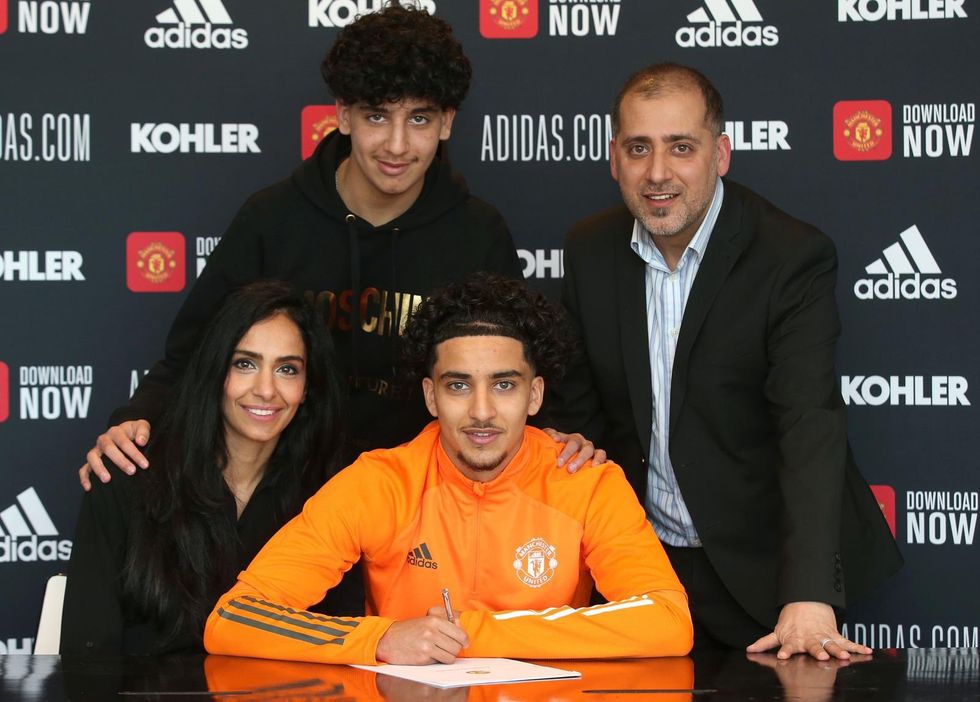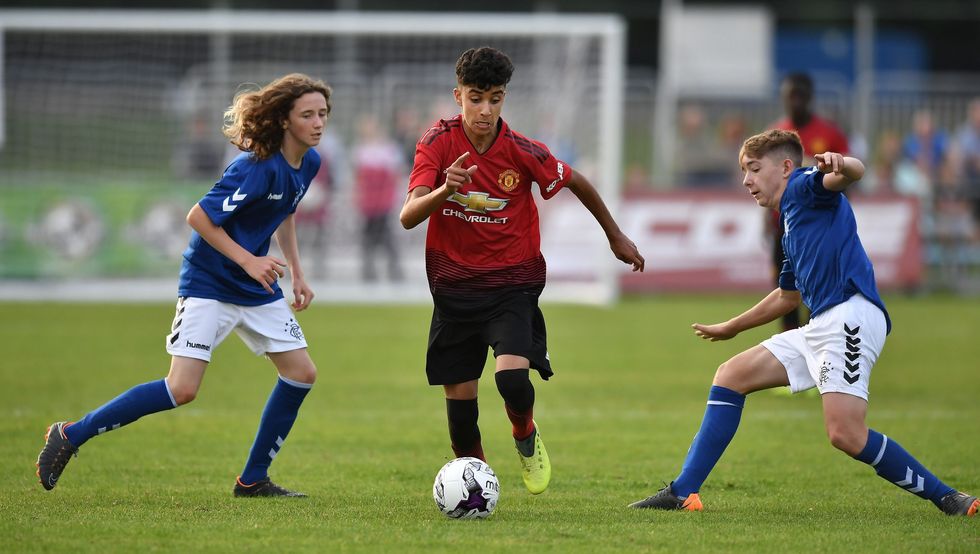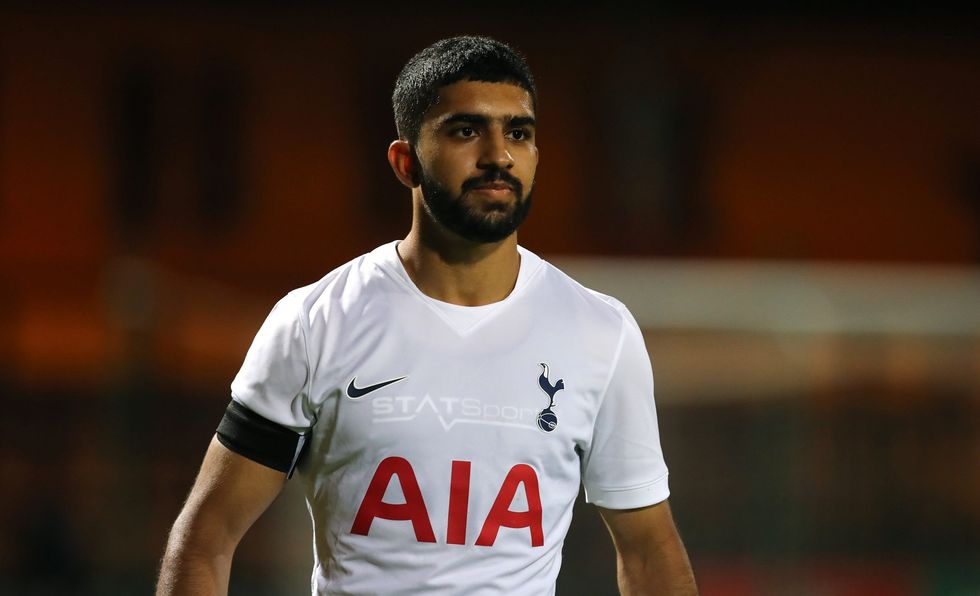Young starlet Zidane Iqbal made history when he became the first British Asian footballer to represent Manchester United.
The 18-year-old came on as a second-half substitute in the Red Devils Champions League match against Swiss side Young Boys on Wednesday (8).
Iqbal joined United at nine. Having come through the various age groups, he signed a professional contract with English football's most decorated club in June.
“It feels amazing, I’ve been working my whole life for this opportunity, it’s a dream come true, it’s just the start and hopefully I can keep pushing on,” Iqbal told MUTV after his debut match.
Iqbal’s family, who were at Old Trafford, and British Asian football fans revelled at seeing the midfielder grace the Theatre of Dreams.
Apna England (Our England), an England supporters’ group tweeted, “What a moment for Zidane and the family! Remember the date! A British South Asian just played for @ManUtd in a Champions League match!”
Named after legendary French World Cup winner, Zinedine Zidane, Iqbal was destined for stardom from a young age with his first coach revealing he had to put Iqbal in-goal or take him off because he would run rings around other children in the Sale United under-5s team.
"When we played a few six-a-side competitions [as he got older] he would do very well. He would stand out," coach Stewart Hamer told Sky Sports News.

"We got to the point where sometimes we would have to take him off the field in fairness to the opposition because he was just too dangerous on the field and it didn't feel fair on the others. We had a process, even in four, five and six-a-side where the kids would play in all sorts of different positions.
"So they all took the part and played in goal and Zee would quite often go in goal for us, and he was happy to do that. I've still got visions of Zee being in goal and leaning on the goalpost, waiting for something to happen!
"But he's just never changed. He's just very focused on his football career. And what happened [with him making his Manchester United debut] was just the icing on the cake so far. But it's only the beginning of the story, hopefully."

Iqbal was born in Manchester to a Pakistani father and an Iraqi mother. He has spoken about the important role his family has played in his footballing journey.
"I come from such a hard-working family. My parents are always working hard, my brother, my grandparents," he said.
"When we came to this country, they all inspired me to give my best at everything I do."
The level-headed youngster also revealed the impact former Arsenal playmaker Mesut Ozil has had on him.
"Mesut Ozil (is my hero), because he's a Muslim like me. Just seeing another Muslim footballer is a good thing," he revealed.
"The journey is different for everyone, and I can tell you it's not easy. It's like a rollercoaster, up and down. You just have to enjoy the ride and whatever's meant to be is meant to be."

Iqbal is eligible to represent England, Iraq and Pakistan at international level.
Last month he played for Iraq’s U23 side which reached the WAFF (West Asian Football Federation) Championship semi-finals where it lost to Saudi Arabia. He also played against the United Arab Emirates and scored against Lebanon.
He scored for United’s youngsters against Sunderland in the EFL Trophy last month and against Italian side Atalanta in a Youth League game.
Apna England described Iqbal as an “exceptional talent” who can go on to inspire the next generation of British Asian footballers.
“This is obviously a proud moment for everyone associated with Manchester United Football Club but it is also absolutely monumental for South Asians in the game,” its spokesperson told Sky Sports News.
“Zidane Iqbal is an exceptional talent, whose commitment, work ethic and dedication to making it at the highest level has been rewarded by one of the biggest clubs in world football.
“With urgent action required to tackle inequalities that persist across football, there is no better way to inspire change than by highlighting those that are blazing a trail in our game.
“Seeing Zidane Iqbal out there making history will no doubt inspire millions across the world. It’s a great day for the community – and a great day for football.”
Iqbal’s feat came weeks after Dilan Markanday, another British south Asian footballer, made his debut for Tottenham in October.

There are only three other British Asian footballers who are on full-time professional contracts with Premier League clubs – Leicester City’s Hamza Choudhury, Aston Villa’s Arjan Raikhy, and Wolves defender Kam Kandola.
England manager Gareth Southgate has stressed football needs to do more to engage and tap into the British Asian pool of talented players.
"Sometimes the Asian voice has been lost in the anti-discrimination argument," Southgate said
"And when you look at the percentages of the population that we're talking about, it's high numbers. Frankly, it's a big talent pool that we're missing within football. We don't have high numbers of English-qualified players playing anyway, clubs in their academies are always searching for talent.
"It's like in any business. If you're only selecting from a smaller section of the population, then what are you missing?”

Southgate added: "What I've noticed with the England team in recent seasons is that dynamic in terms of the supporters coming up to me has changed a lot, far more Asian people, coming up to me, talking about their pride in the team, talking about the diversity of the team
"That could only be even more powerful if someone from the Asian community was in the team as well, and we had that greater representation across the board."






 A compelling premise, layered and unpredictable charactersAMG
A compelling premise, layered and unpredictable charactersAMG Anyone who enjoys a gripping story with a diverse cast and unexpected twistsHarperFiction
Anyone who enjoys a gripping story with a diverse cast and unexpected twistsHarperFiction








 As WCL enters its second season, Sharma is scaling upwclegends.uk
As WCL enters its second season, Sharma is scaling upwclegends.uk


 Scarlett Johansson opens up about breaking free from early typecastingGetty Images
Scarlett Johansson opens up about breaking free from early typecastingGetty Images  Johansson reflects on her childhood stardom and evolving careerGetty Images
Johansson reflects on her childhood stardom and evolving careerGetty Images  From Avengers to auteur Scarlett Johansson embraces creative control Getty Images
From Avengers to auteur Scarlett Johansson embraces creative control Getty Images